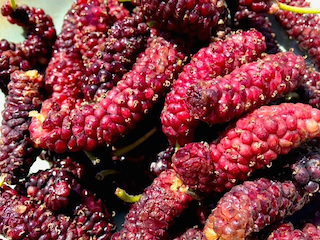Working With and Learning From Nature
The Magic of Mulberries

Episode 15: Loren Luyendyk has been working with Mulberry Trees for over 15 years. In this episode Loren talks about why more people should be growing this incredibly versatile plant.
Did you know that Mulberry Trees can adapt to almost any soil type? That they are hardy to drought and temperature extremes? Learn the best way to propagate Mulberries and the medicinal uses of Mulberry leaves and root bark. The Mulberries themselves are delicious and high in Vitamins A and C.
Loren Luyendyk is a Permaculture teacher, designer, and owner of Santa Barbara Organics, a comprehensive Sustainable Landscape and Agriculture Design and Consultation Service.
Podcast: Play in new window | Download (Duration: 15:19 — 10.5MB) | Embed
I know the mulberry can be highly allergenic and its cultivation is banned in some places. Is that true for all varieties? Is the plant dioecious? Can different varieties be grafted onto the rubra rootstock?
Thanks. I live in Virginia and I have red mulberry growing everywhere.
Hi, I checked in with Loren Luyendyk and he had this to say, “Yes mulberry can be allergenic, especially the male trees that are used as fruitless street trees. The trees are mostly dioecious, but can be monoecious too apparently. I was not aware of restrictions on planting, maybe in areas where they could become invasive. Yes you can graft any species of mulberry onto another species. The issue is white(alba) and black (nigra) are not as frost hardy as red (rubra).”